Contents
- The Bias That Binds: A WW2 Story About Problem-Solving
- Turning Your KPIs into Tangible Career Value
- 5 Habits That Align Your Work with What Really Matters
- Your Next Big Career Win is Within Reach
If you make just one New Years resolution this year – make it this: No more flying under the radar. This is the year your work gets the recognition it deserves, right? Here are 5 powerful habits that show you how top performers turn their goals into tangible career growth.
Only 14% of people in tech were promoted last year.
Everyone WANTS to get ahead, but the reality is that 86% of people don’t make it.
In an unsurprising analysis of 245,000 US-based tech workers – over a 12-month period, Pave discovered that the higher up you go, the fewer promotions there are.
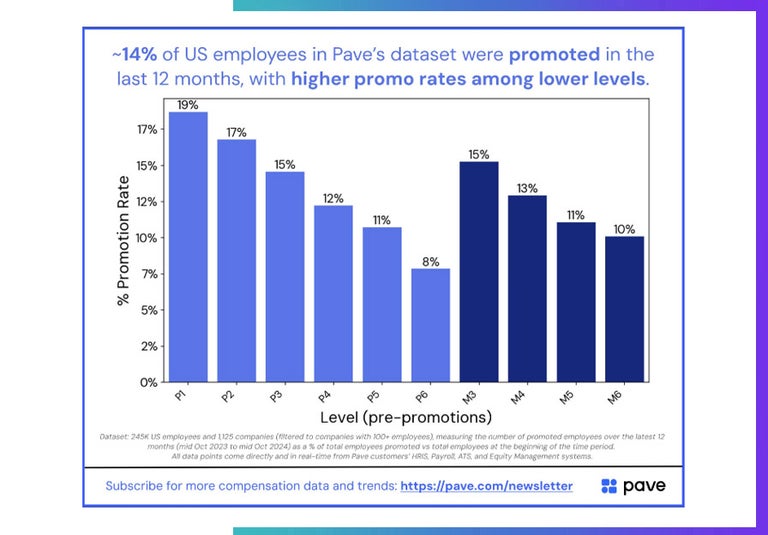
So, your reward for soaring high is increased career growth turbulence.
Just look at what you’re up against!
Layoffs targeting top talent, cutthroat competition for scarce leadership roles, department shakeups, dwindling remote opportunities, and relentless return-to-office mandates disrupting your climb.
And the worst of all of them….exhaustion.
It pays to know how to link your current KPIs to your next big promotion.
Because delivering authentic value is an intentional practice.
Embrace these simple habits so that you know what to avoid, and where to focus your efforts for maximum returns in 2025.
A well-earned promotion, a hefty pay bump, even landing a dream job so incredible you’ll kick yourself for not embracing them sooner – these are within your reach.
The Bias That Binds: A WW2 Story About Problem-Solving
Have you heard this story?
During World War 2, a mathematician named Abraham Wald was given a simple task. He had to analyze the damage on returning Allied bomber planes, so that the army could reinforce the aircraft.
A reinforced plane meant safer pilots and more successful missions.
Military officials were eager to add armor to the wings and fuselage areas of the plane that had the most bullet holes. It made sense to armor those vulnerable areas.
But Wald spotted a HUGE oversight.

The data was based on planes that returned from missions – not the ones that were shot down. It was actually the undamaged areas of the returning planes that were most vulnerable – and led to the most losses.
When planes were shot there, they never made it home.
A bias was at play here called survivorship bias.

It’s a type of bias that tricks us into focusing on the wrong problems.
The story of Abraham Wald shows us how easily we focus on successes (what we can see) and ignore failures (what we don’t see).
And while bias isn’t inherently bad – when applied to our complex work lives it can cause havoc in our decision-making and problem-solving abilities.
It needs to be recognized and changed so that your judgement isn’t constantly distorted. Need an example?
Look at LinkedIn.
Every day you see your peers being promoted, experiencing career highs and achieving impossible feats of success.
You don’t see the stress, struggle and fight behind those shiny posts, so you don’t think about them. You simply believe their career paths were blessed, straightforward, or lucky – and you have no idea why YOUR career hasn’t gone the same way.
Well friends!
It’s possible that you’ve been letting bias run your life. You’ve focused on the wrong problems, and have completely overlooked the ones that encourage meaningful career growth.
Turning Your KPIs into Tangible Career Value
Goals are great – I love them.
But they aren’t enough to influence your day-to-day career. In tech, we all have key performance indicators that help us measure the value we’re bringing to our goals.
Nothing is more clear-cut than performance metrics linked to a quantifiable way of tracking your progress.
Goals help us understand WHAT we want to achieve, but KPIs are all about the HOW. Everyone in tech knows how they work!
That’s why applying them to your career can be so beneficial.
Goals look like this:
- Get promoted
- Earn more
- Land a hot new remote job
KPI’s look like this:
- Complete 3 AI courses in Q1 and implement what you’ve learned for Q2
- Achieve a 95% positive feedback rating on customer surveys in 2 months
- Automate your email workflow this week to reduce inbox noise by 80%
Which of these do you think will get you closer to being recognized as a stand-out employee? Bias keeps most people stuck on goals without the right perspective.
- Only 3% of people have written goals.
- And 92% of them don’t achieve these goals.
Yikes.
Most people are on autopilot – bound by biases they can’t see.
We asked our LinkedIn community of 7.8 million global remote workers a question: If you could pick ONE metric to judge your work what would it be?
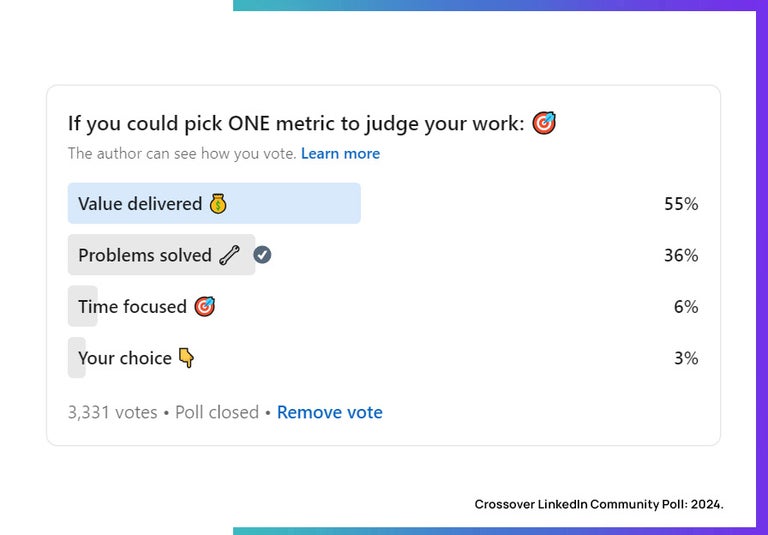
More than half (55%) of the 3,331 respondents said that they’d pick ‘value delivered’ as their primary metric. Second was ‘problems-solved’ (36%) and third was ‘time-focused’ (6%). Clearly, remote workers thrive when they can link their work to tangible results.
But if your current KPIs aren’t aligned with the career metrics that matter, you’re always going to miss opportunities for recognition, promotion and pay rises.
So, let’s bridge the gap and plunge into the habits that will make your KPIs work for you this year.
5 Habits That Align Your Work with What Really Matters
Are you still armoring the wrong parts of your career?
Just like Abraham Wald’s planes, focusing on the wrong metrics will leave your biggest vulnerabilities exposed.
These 5 habits will help you zero in on what really matters: value, impact, and getting the recognition you deserve.
Habit #1: Fix Problems No-one Else Notices
AKA: The planes you don’t see.
You’re an entire human being with subject matter expertise. Your unique concoction of experiences and knowledge means you’ll likely see things others don’t.
Wald’s genius was identifying the damage on planes that didn’t make it back from battle. Your most valuable contribution often lies in tackling overlooked (or invisible) issues that just aren’t on your team’s radar.
Link these to business outcomes and you massively boost your value.
- Do you know what your company goals are?
- What your bosses’ goals are?
- What your team’s goals are?
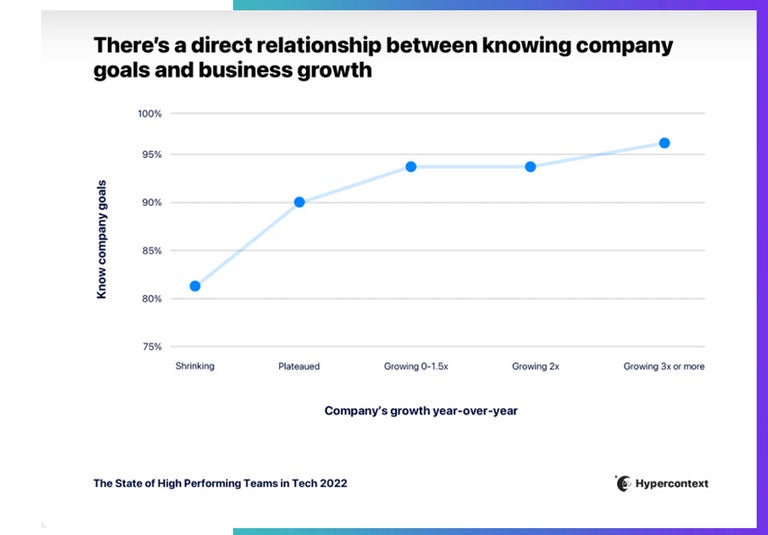
Most employees stay in their lane, do as they’re told and keep their heads down. You’re not going to do that.
Be proactive in finding hidden problems that you can solve. Think beyond your role to how you can function as someone within the company that is genuinely working to make things better, faster, and more efficient.
The measurable impact of solving significant problems will prove your value far beyond any surface-level contribution you make.
Habit #2: Focus on the Right Problems
AKA: Don’t waste energy fixing bullet holes.
Prof Michael Porter said, “The essence of strategy is choosing what not to do.”
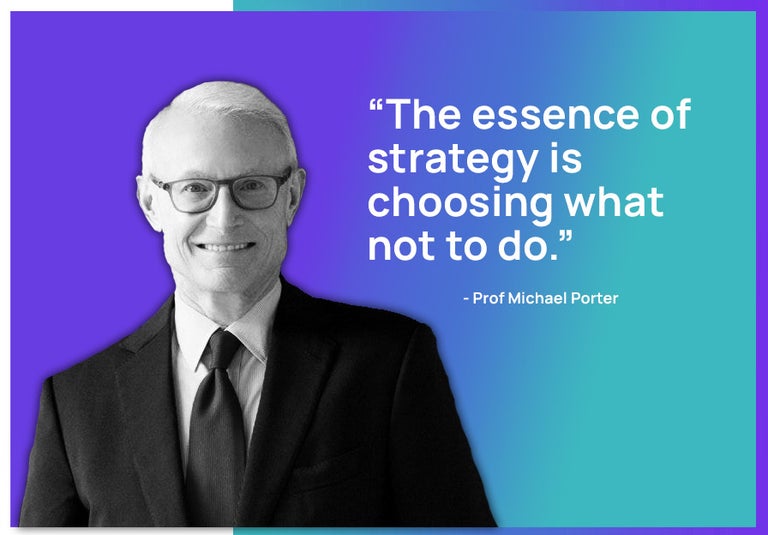
You need to be more strategic when picking your work battles.
We all get our KPIs and quarterly expectations within our job roles. But sometimes these KPIs aren’t aligned with your career goals, or they’re not the biggest problem you’re facing in your job right now.
You only have a finite amount of personal drive (energy, motivation, inspiration, innovation – you get it).
And there are ALWAYS low-priority tasks that drain your time and energy. Your job is to focus on the right problem to maximize your personal resources.
Wald had an entire team of engineers on standby waiting to repair bullet holes and armor planes in the wrong places. You need to avoid the trap of focusing on the readily available, easy-to-solve problems proposed by others that don’t offer much value.
Instead, focus on strategic high impact KPIs that matter to you.
- Team success is a priority (how can you help?)
- Making your leaders look great is a priority (where are the big wins?)
- Achieving something significant each quarter is a priority (What will it be?)
These are the strategic KPIs that need to run alongside the ones you are assigned.
So even if you’re forced to mend bullet holes, you’re also spending time on problems that won’t tank your career or make your job redundant.
Habit #3: Position Your Work for Recognition
AKA: Don’t fall off the radar.
This one’s tough, especially when you’re an introvert and don’t like to be the center of attention! Luckily when you work remotely there are async tactics you can use to completely avoid the uncomfortable ‘look at this good work I did’ necessity.
Some remote workers, particularly the ones who work in hybrid or office-first environments - suffer from a monstrous plague called proximity bias.
This is when being present at the office leads to preferential treatment, even if your results are great.
- 67% of supervisors see remote workers as more replaceable
- 85% of leaders lack faith in remote colleagues
- 42% of managers sometimes FORGET to assign work to remote employees!
Most horrifying of all, 96% of US execs admit to noticing the work of office employees MORE than their remote working counterparts.
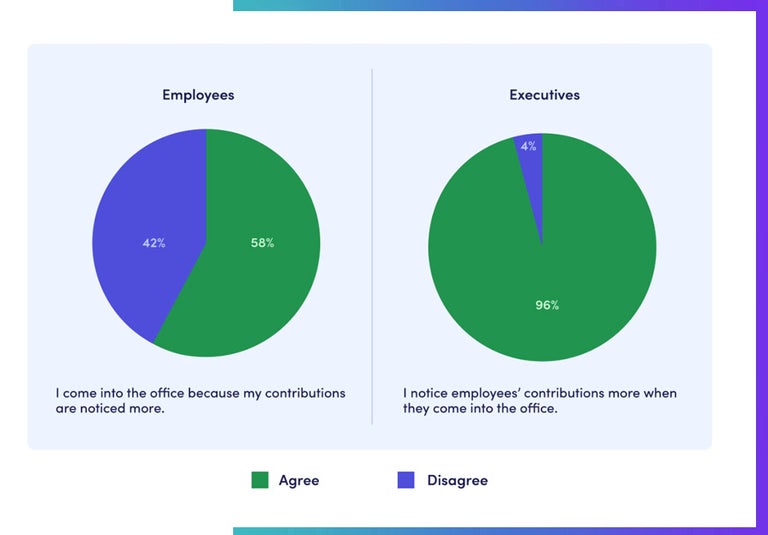
No-wonder it’s harder to get promoted when you work for hybrid companies!
There’s a reason why the planes in Wald’s story were forgotten – they weren’t there. Proximity bias favors visible contributions, so you must adopt habits that actively combat your physical absence.
- Set 1:1 meetings with your boss and share weekly wins or progress based on your KPIs
- Upload weekly, monthly or quarterly analytics reports and tag everyone
- Mention (and celebrate) the big wins in team meetings
Expressly state how your work ties to company goals, and build relationships with decision-makers so that your contributions are noticed.
Habit #4: Showcase Hidden Value
AKA: Spotlight the invisible.
You can have a positive impact on your team by being the person who acknowledges, recognizes and encourages their successes and wins. In remote work, so much of what we do is siloed, and secret – that the impact of calling it out can be significant.
- Monthly recognition makes team members 45% more engaged at work
- Three quarters of US teams feel recognition gives their work meaning & value

This goes a long way to helping you become a person of influence on your team.
And influential people are seen as leaders, they motivate others and drive positive change in organizations. They’re the natural choice for advancement when the time comes!
Wald proved that unseen data could be more valuable than what was visible to his team. As a remote worker, you must uncover and spotlight the unseen wins that drive overall team success.
- Sharing a success metric they earned with a single team member
- Always being available to help or provide insight for a team member
- Making sure everyone’s voices are heard in team meetings
- Use your expertise to set your team up for less risk and more success
Don’t just be the person seeking the spotlight, be the person who shines the spotlight on the people in your team who do great work.
Habit #5: Challenge Decisions Based on Bad Data
AKA: The danger of the visible majority.
There are always opportunities to challenge assumptions, fix outdated processes and raise concerns about the products, practices (and sometimes people) that aren’t serving the team or the company anymore.
This is the most difficult habit to adopt – because it’s risky.
A lot of companies like the status quo. They cling to outdated playbooks and don’t like people who make waves. This is why DATA always has to be on your side. You can’t argue with data. It’s not subjective - it’s fact.
For Wald, making decisions based solely on visible planes risked a lot. He would be reinforcing the wrong areas. His team would be wasting their time. Pilots wouldn’t get any benefit from the work they did.

The majority view had to be challenged. He couldn’t reinforce the bullet holes! This is a habit that will serve you throughout your career.
Never be a yes person! Never go along with directives because ‘that’s how things are.’ And always be prepared to rock the boat if you’re near an iceberg.
A few years ago, Andrew interviewed Rahul Subramaniam in India, an extraordinarily successful CEO of several fully remote tech companies.
His advice was: “Always have a go-to-hell-fund.”
This is invaluable advice!
When you have a year’s worth of pay saved, you’re not afraid to speak out, challenge norms and fight for change. Even if things go wrong and you get fired or have to leave, your go to hell fund provides.
Watch the video below:
Bottom line: Always question team practices, propose improvements and speak out against inaccuracies or injustices happening on your team. And use data to back up your claims, and validate your solves.
People who make smart, independent decisions single themselves out.
Your Next Big Career Win is Within Reach
It’s KPI season! Might as well connect some dots.
Abraham Wald’s story is a career blueprint for elite remote workers and a powerful set of lessons in decision-making.

When you focus on overlooked vulnerabilities, align KPIs with strategic career goals and proactively solve high-impact problems – you set yourself up for tangible success.
While everyone else is distracted by ‘surviving’ the year and not being laid off – you have the chance to streak ahead. Don’t let survivorship bias keep you from advancing.
Adopt these 5 habits:
- Fix Problems No-one Else Notices: Like Wald’s undamaged planes, the issues no one talks about are often the ones sinking your career. Fix them first.
- Focus on the Right Problems: Don’t waste your energy solving bullet holes that don’t matter. Prioritize high-impact work that aligns with your career goals.
- Position Your Work for Recognition: Remote workers can’t rely on chance. Share wins, upload reports, and make sure your boss can’t ignore you.
- Showcase Hidden Value: Elevate your team’s wins, and you’ll become the leader everyone wants to follow. Recognition breeds recognition!
- Challenge Decisions Based on Bad Data: Data beats opinions. Speak up, back your claims with facts, and watch how quickly you stand out.
Stop armoring the wrong parts of your career and start building habits that turn your KPIs into real career wins.
Your next big promotion, raise or job role is waiting for you. No more flying under the radar!
Want to work with people who have this mindset?









